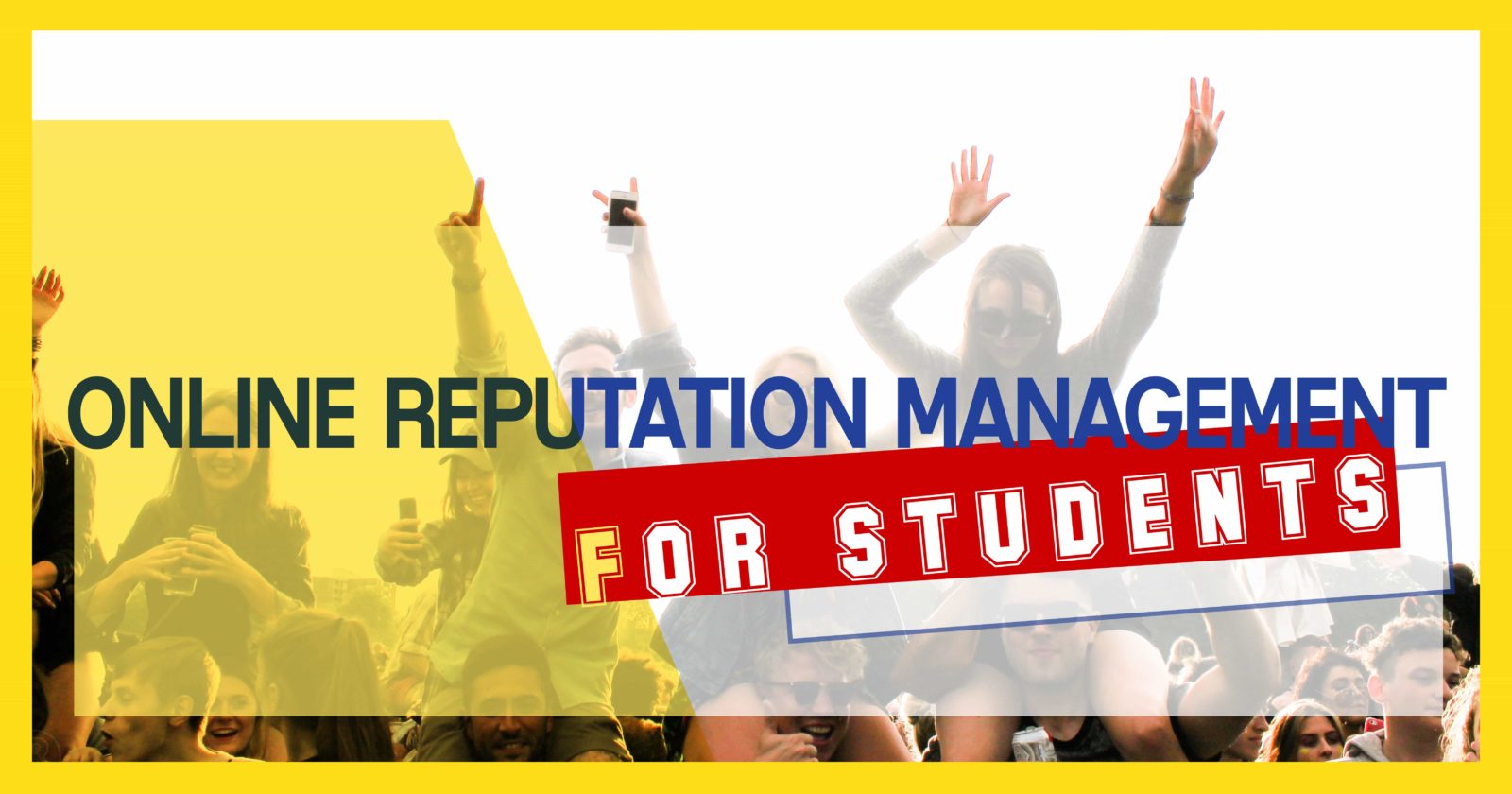This is a sponsored post written by SearchReputation.net. The opinions expressed in this article are the sponsor’s own.
From Graduate to Unemployed
Your days of partying at the neighborhood fraternity house, posting risqué Halloween photos of you and your friends on Instagram, and starting politically-charged Facebook debates are about to come to an end.
With a looming pile of student debt haunting your bank account, you’ll soon realize that your diploma isn’t enough to land you your dream job.
The carefree debaucheries that are all over your social media profiles are now being scrutinized by potential employers, and in an uber-competitive job market, they’re looking for any reason to reject you as a candidate.
Getting your foot in the door of your dream job is tough as is, but it can be nearly impossible to score without carefully curating your online reputation.
Employers Can & Will Check Your Social Media Profiles
Are you the type of student who avoids social media like the plague?
Or are you one of those Instagrammers who posts about everything that’s happening throughout their day?
Both cohorts have their perils.
The former social media ghost is failing to protect their online reputation while the latter may have posted a plethora of reputation-damaging information for all future employers to view.
According to a 2017 CareerBuilder study, approximately 70 percent of employers use social media as a screening method for all job candidates. As a new norm in the toolbox of HR capabilities, 30 percent of recruiters are tasked with scanning candidates’ social profiles.
What exactly are HR professionals searching for? According to the study:
- 61 percent of hiring managers are interested in uncovering online information that supports the qualifications that are in the candidate’s CV.
- 50 percent are determined to scope out whether the candidate conveys a professional regard.
What’s even more disconcerting are the results that were found in a 2010 study by JobHunt.org: 70 percent of HR professionals disqualified candidates upon discovering elements of a bad online reputation.
Even more recently, CareerBuilder found that 57 percent of employers didn’t accept candidates for an interview if they failed to find online information about the individual in question.
What Google’s SERPs Say About You
Google can expose a lot of dirt on a student who’s on the job hunt.
Wondering what the search engine results page (SERP) looks like under your name? Give it a go, opting for the traditional Google search.
Perhaps you were a part of a university association that favored late-night boozefests after a big win in your school’s business case competition. Or maybe your local sorority’s policies were lenient, making way to forums that depict your organization’s illegal hazing rituals.
Your name could have been mentioned in such a forum, or saved from a peer’s Snapchat story, thus putting your reputation at risk. The SERP takes no prisoners.
If both your social media profiles and Google results need tweaking in time for your third-round job interview, there are thankfully many strategies you can implement to lessen the blow that a bad online reputation may have on your future career.
Don’t Delete Your Social Profiles
A bad online presence can be detrimental as you try to start your career. However, you can easily control your social profiles, such as Facebook and Instagram, and what Google sees.
Instead of deleting your profiles, delete the controversial content that may cause your employer to think twice about your candidacy. The trick is to view your account as though you were in the shoes of a recruiter.
Would a recruiter favor a photo of you riding the mechanical bull during country night at a bar? What about that long-winded post about your disapproval of the current president running your country?
These items demonstrate a lack of seriousness and a heavily negative disposition — qualities that you don’t want your employer to see.
Curate Your Social Profiles to Showcase Your Strengths
As you get thrown into the real world, it’s time that you view social media as a means of displaying your accomplishments, hobbies, and interests. Act like you’re a brand, and a slew of opportunities will come your way.
That doesn’t mean you’re forbidden from posting respectful photos of you during family and friend outings — simply think twice before you decide to post this content.
If you are an avid tennis player and won a silver medal in your first competition, publish a post highlighting your pride.
Working late on a special project with your two best friends? Let the world know with a cute sneak peek of the final product.
Employers look for individuals who instill passion in their pastimes instead of simply sitting at home watching Netflix day in, day out.
The Power of LinkedIn
If you haven’t already created a LinkedIn profile, stop everything you’re doing and get on it.
LinkedIn will, more often than not, show up on the first page of Google under a search for your name. So make continuous updates to your education, awards, work, and volunteer experience.
If you aren’t familiar with the platform, LinkedIn is a comprehensive alternative to an online CV. For a student straight out of college hoping to snag a Business Analyst position at a Big Four, the job hunt is made easier through intuitive application methods straight on LinkedIn’s job section.
Connecting with individuals that you meet at conferences and networking events becomes a no-brainer with LinkedIn.
If you want to add a competitive layer to the mix, ask your previous managers and colleagues to post a recommendation on your profile. The more activity you receive, the better your online reputation will appear.
Use Privacy Settings
Dedicate a few hours toward managing your privacy settings on all your social media platforms.
For instance, Facebook has the option to control what is posted on your timeline through an approval process. Any time someone tags you in a post, you can conduct a timeline review and decide whether you want that specific post to appear on your profile.
Nonetheless, the poster’s Facebook friends can still view the photo even if you do not accept it – in which case, you should un-tag yourself from the photo.
Brand Your Own Website
While curating your social profiles is a valuable way to maintain a positive online image, gaining as much proprietary branded information is another method students can use to shine on the SERP.
Online reputation services dedicate their entire livelihood to highlighting the best aspects of a company or individual, crafting together the ultimate business card for all future endeavors. One of ORM companies’ trade secrets includes creating websites with the specific keyword in question.
For instance, if John Doe has photos of him puking at a rave on the first page of Google, online reputation managers’ first line of attack would include creating johndoe.com and regularly updating its content and blog section to indicate search engine relevancy.
If you’re a student searching for your dream job, then this website strategy holds particular significance for two reasons:
- It will help protect your online reputation from damaging material that is floating around the web.
- It also provides another platform for you to showcase your skills, achievements, and professional background.
Bonus points if you’re looking to work in a creative field as your site houses the perfect foundation for a virtual portfolio.
Link Building: The Ultimate ORM Bullet-Proof Strategy
Want to take extra precaution? Then you should become your own online reputation specialist.
Ask the online reputation manager of any ORM company — the bulk of their work is rooted in content writing.
In order to support the SERP ranking of your social media platforms and website, you must write various articles about your achievements and student initiatives to be featured on a string of blogs.
If possible, partner up with university associations and student life organizations by asking them to post your editorials on their respective websites. Most university sites have high domain authority, which can help improve the visibility of your positive content in Google’s search results.
The anchor text — which should be your name — in each article must then link back to your social profiles and website.
Generate Automatic Alerts About Your Digital Reputation
Take the driver’s seat when managing your digital reputation. Leave no incident up to faith.
Features such as Google Alerts and Trackur implement social media monitoring even while you’re asleep. With every mention of your name, you will be notified of the latest news, giving you the chance to extinguish any potentially crippling results about your reputation.
You never know… Someone could have snapped an embarrassing photo of you while inebriated at a party and all of a sudden, the photo (which you have never seen) may appear on the first page of the SERP after having lived on a forum for years unbeknownst to you.
Beat the Competition with SERP Presence
Think you’ve got a good resume? Even if you haven’t run into a digital reputation incident, it could happen.
Check your ego at the door and recognize the importance of online reputation management to your future. Curating a noteworthy online presence — via social media platforms (hello influencers!), branded websites, and consistent backlinks — can create an inbound effect of recruiters reaching out to you.
The same way the aforementioned tips can be used as a hefty damage control strategy, you’ll prove to be ahead of the game if you implement them as a pre-emptive strategy.
Don’t wait around for your profile to get noticed! Make it easy for employers by placing your strong points right before their eyes – on Google’s coveted first page.
A Great Online Reputation Doesn’t Happen Overnight
Although you may want or expect an instant fix, each step of the online reputation game must be administered organically in time. Don’t expect astonishing results to happen overnight.
The ORM experts at SearchReputation.net recommend dedicating no more than 10 hours to your online reputation efforts every week.
If you ever meet an online reputation expert who tells you that your bad result can be moved down from the first page of Google in the span of a few months — especially if your unwanted review is ranking at the top of the SERP — you should know that you’re being lied to.
Online Reputation Management on a Student’s Budget
Since the price for online reputation services at a credible agency can add up quickly, ranging between $1,000 to $3,500 a month, it’s best that you stick to your student budget and do the job yourself.
With rigorous drive and consistent effort flushed toward garnering a stellar online reputation using the strategies previously discussed, you’ll be securing your dream job sooner than most graduates your age.
And hey, who knows… Maybe this work will inspire you to open up an online reputation management company of your own! In which case, you don’t even need a job interview.
Image Credits
All images by SearchReputation. Used with permission.






